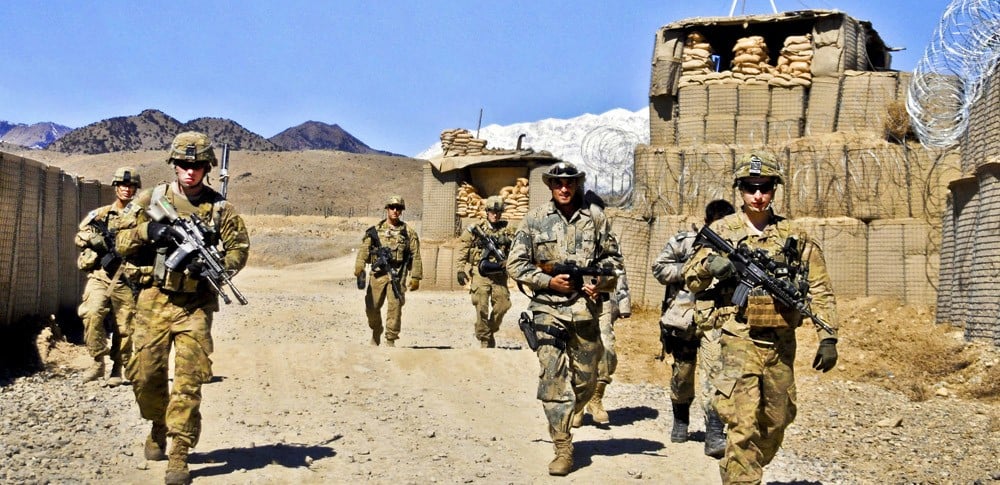
Will Afghanistan descend into chaos or there are prospects for peace after the US withdrawal

Afghanistan is at the crossroads. America’s longest war in the history has come to an end without completely defeating, disrupting and dismantling the rag tag forces in Afghanistan.
Taliban still hold sway over half of Afghanistan, and show no sign of collapse. The departure of US-led ISAF forces and incapacity of the Afghan National Security Force raises some critical questions. Will Afghanistan descend into chaos or there are prospects for peace that is absent since ages?
With the departure of winter, Taliban might be lurking for a new offensive. However, most of the Afghans are optimistic that Taliban cannot not over run Afghanistan once again. There are several reasons for this optimism. First, the stream of international financing for Taliban is nearly drying up. Their financial magnet, Osama Bin Ladin is dead; Saudi Arab has stopped funding the insurgency; and Pakistan is facing its own mess in FATA. Given such dwindling of international financing, the prospects of Taliban overtake are dismal.
Second, the rise of ISIS in Middle East has eclipsed al-Qaeda in Afghanistan and has deflected the attention of Arab and non-Arab Jihadis to a new cause. Afghanistan has been pushed into the backburner, depriving Taliban of financial and manpower support.
Third, the Afghan population has grown war weary. There is consensus among the Afghans that enough is enough! A Pashto poet Rehmat Shah Sayel aptly depicts such sentiments in a couplet as follows. "Oh peace-loving people of the world, stop these warmongers. This is my doomsday, end of my world, I am being killed over and over."
Peace is the cry of masses and Taliban are aware of the changing sentiments among the Afghans who believe that Afghanistan cannot afford another spell of civil war, displacement, and reverse of the progress being made in the years.
Taliban’s rise in 1995 was due to the anarchy prevailing in the country, and they offered a glimmer of hope for peace. However, the problems to which they offered solutions have changed drastically. Taliban’s rigidity blinded them to the ground realities.
Moreover, Taliban are viewed as Pakistan’s proxies by ordinary Afghans. Thus Taliban have lost the space that they had carved in the hearts of Afghan people. Now they have to reshape themselves to find a space in a peaceful Afghanistan.
Fourth, a change has been witnessed in Pakistan’s policy regarding using Taliban as leverage in Afghanistan given Pakistan’s loss of clout over Taliban leadership. Pakistan is no more in a position to play her Pashtun card. Instead of Pakistan’s "strategic depth" in Afghanistan, Taliban have carved their own "strategic depth" in Pakistan. Hence, Pakistan has aligned its interest with a broad-based multi-ethnic Afghan government.
Finally, there is widespread suspicion of the United States’ long term commitment to Afghanistan. In this regard the burden of history looms larger. Cynics allude to Vietnam war when the United States sought "exit with honour" while North Vietnamese army overran the non-Communist South Vietnam, rendering the decade-long US war efforts futile. The South desperately appealed for assistance but such appeals fell on deaf ears in the White House. Others consider the United States as an unreliable partner for the reason that after Soviet defeat she had abandoned Afghanistan. They fear that US will abandon Afghanistan once again.
However, it is naive to believe that US will abandon Afghanistan. It is well known to the White House and Pentagon that Afghan National Security Force is ill equipped to halt the Taliban onslaught. Given such incapacity of the Iraqi forces, and failure of the United States to form a board-based multi-ethnic government in Iraq, ISIS carved a space for itself in the Middle East. The rise of IS has drawn a reluctant United States back to Iraq which must serve as an eye-opener for American leadership. Given this lesson in Iraq, it is hoped that American leadership will not forget Afghanistan.
Though Taliban overtake has no prospects, their outright military defeat has no prospects either. However, as major stakeholders in a peaceful Afghanistan, they need to be adjusted in the legislation and administration of the country. The Afghan leadership has shown considerable flexibility and prudence in forming a broad based multi-ethnic government in aftermath of 2014 presidential elections.
Now the onus is on Ghani’s administration to bring Taliban to the negotiating table and initiate a process of reconciliation to end the 35-year old war in Afghanistan.